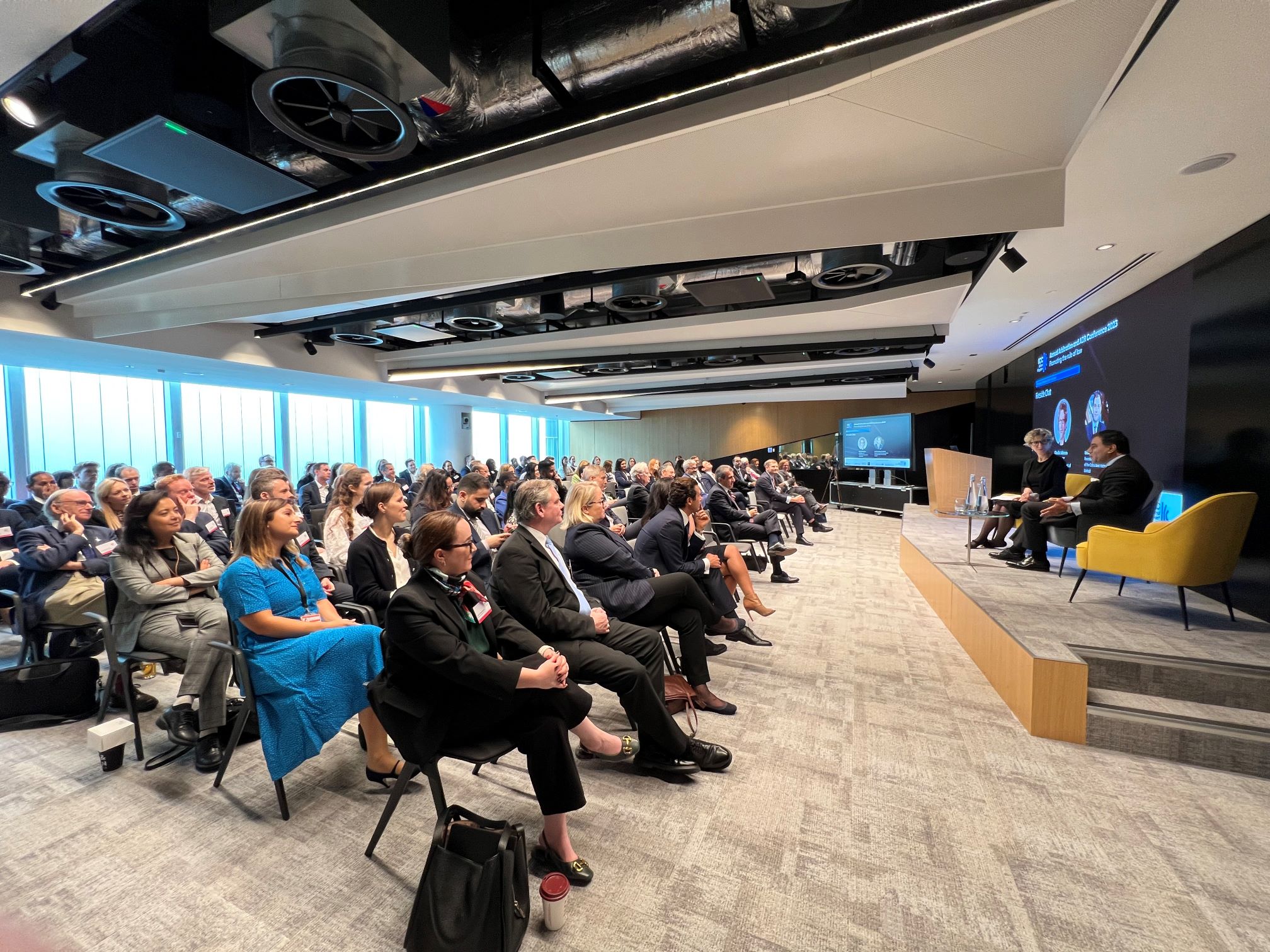REGISTRATIONS OPEN :
Sustainable Global Supply Chains: Turning Ambition into Action
Business Leadership for a Net-Zero Future
Climate change is no longer a distant concern; it’s an immediate reality impacting communities worldwide. Global news is filled with reports of record temperatures, flooding and extreme weather events. In 2024, global temperatures surpassed pre-industrial levels by 1.5°C for the first time, with the average global temperature reaching 1.6°C above this benchmark. This milestone highlights the urgency for comprehensive climate action. Our window of opportunity to take effective action is shrinking as we witness changes the world has never seen before.
Many organizations have started to rapidly address their direct emissions, but not enough has been done to reduce indirect emissions, including the emissions arising from suppliers and consumers. With global supply chains accounting for as much as 80% of the world’s total carbon emissions, it is vital for business to step up the pace in reducing indirect emissions.
Now, more than ever, as global supply chains evolve, businesses must take the lead in reducing Scope 3 emissions, helping their supply chain partners to integrate sustainable trade practices, aligning with net-zero targets, and putting sustainability at the core of their business practices and operations. It is only through co-operation that business can help to limit global warming to 1.5°C.
This conference will bring together business leaders, policymakers, investors, and sustainability experts to:
- Understand the Scope 3 landscape and the latest methodologies for managing emissions.
- Explore innovative solutions in technology, finance, and policy to drive sustainability.
- Address human rights and social equity in global supply chains.
- Mobilise finance through carbon markets, sustainable investments, and green finance mechanisms.
- Shape the future of policy by engaging with international regulators and trade institutions.
Discussions will shape ICC United Kingdom policy agenda and the business input into key policy forums at the UN, WTO and G20.
Reading Material:
- 2024-ICC-Using-competition-law-to-tackle-climate-change-and-unsustainable-practices
- 2024-ICC-The-role-of-voluntary-carbon-markets-in-mobilising-finance-to-accelerate-climate-action-1
- 2024-ICC-Principles-for-Sustainable-Trade-Wave-3
- 2024-ICC-Oxera-The-economic-cost-of-extreme-weather-events 2023-ICC-Rules-on-Combating-Corruption-
- https://actuaries.org.uk/document-library/thought-leadership/thought-leadership-campaigns/climate-papers/planetary-solvency-finding-our-balance-with-nature/
- https://institute.global/insights/climate-and-energy/the-climate-paradox-why-we-need-to-reset-action-on-climate-change
- https://eciu.net/analysis/reports/2025/net-zero-economy-across-the-uk
Arrivals, Coffee & Networking
Welcome Remarks
- Emma Bennett, Chief of Staff & Director of Operations, ICC United Kingdom
- Rob Doepel, UK&I Managing Partner for Sustainability, EY
Opening Remarks – Chair of the ICC United Kingdom
- Lord Karan Billimoria
Keynote – 2030 in Sight, 2050 at Stake: Accelerating Action for People, Planet and Prosperity
- Hon. Shirley Ayorkor Botchwey, Secretary-General of the Commonwealth
Keynote – Ten Years Since Paris: A Moment to Unite, a Mission to Deliver
Overview:
A decade after the adoption of the Paris Agreement, what progress has been made? This keynote will explore global climate leadership, policy changes, and trade dynamics while looking ahead to COP30 in Brazil.
- Minister Alexandre Brasil da Silva, Deputy Head of Mission, Embassy of Brazil to the UK
Opening Remarks – Chair of the ICC United Kingdom Sustainability Committee
- Gabrielle Giner, Head of Environmental Sustainability, BT, and ICC Sustainability Chair
Panel 1 – The Cost of Inaction (ICC-Oxera Report)
Overview:
The economic cost of inaction on climate change is staggering, with climate-related extreme weather events costing the global economy more than $2 trillion over the past decade. This panel, based on the ICC-Oxera report, will examine the financial burden of extreme weather, global supply chain disruptions, and insurance risks.
Speakers:
Moderator: Robert Catherall, Oxera Consulting
- Thomas Tayler, Head of International Sustainability Policy Advocacy, Aviva
- Wendy Walford, Head of Climate and Nature Risk at L&G, and Institute of Actuaries Board Member
- Sophie Talarico, Policy Manager Climate, International Chamber of Commerce
Coffee Break
Panel 2 – Driving Ambition via Policy & Regulation: Unlocking the Net-Zero Economy
Overview:
The transition to net zero is not just an environmental imperative—it is an economic opportunity. This session will explore how smart policy and regulation can catalyse innovation, drive investment, and unlock economic growth. Drawing on the latest evidence from the UK’s net-zero transition, the panel will examine how governments, business leaders, and trade institutions can work together to create stable, investable policy frameworks that enable long-term business planning and accelerate the shift to clean, resilient growth.
Rather than framing policy as a burden, this session will focus on how well-designed regulation can de-risk investment, stimulate private sector leadership, and ensure countries like the UK remain competitive in the global race for green investment.
Speakers:
Moderator: James Macgregor, Director at Resilient Value Advisors and Digital Fellow at Exeter University
-
- Mark Johnston, Founder & Director, UKBBF
- Lindy Fursman, Director of Energy & Policy, Tony Blair Institute for Global Change
- Charlotte A Weston, Director, Sustainability, Clients and Markets Leader, EMEIA Public Policy, EY
- Jess Ralston, Head of Energy, Energy and Climate Intelligence Unit
- Bruno Gardner, Head of Climate Change and Nature, Phoenix Group
Lunch Break
Panel 3 – Trade, Carbon, and the Climate Transition
Overview:
Carbon pricing mechanisms — including carbon taxes, emissions trading systems (ETS), and voluntary carbon markets — are becoming central tools for businesses striving to decarbonise complex, global supply chains. This session will explore how businesses can strategically integrate carbon pricing into their Scope 3 emissions reduction plans, leverage digital innovations for carbon footprint tracking and credit verification, and navigate an increasingly fragmented trade landscape shaped by mechanisms like the EU’s Carbon Border Adjustment Mechanism (CBAM).
As global carbon pricing initiatives intersect with emerging trade policies, climate subsidies, and regulatory divergence, it is essential for companies to understand both the risks and opportunities this evolving environment presents. This panel will examine how carbon pricing tools can support fair, predictable, and effective climate action across borders — while avoiding greenwashing and unintended market distortions.
Discussion Points:
- Embedding Carbon Pricing into Supply Chains: How can companies integrate carbon taxes and emissions trading schemes into their net-zero strategies, particularly for Scope 3 emissions?
- The Rise of Voluntary Carbon Markets (VCMs): What role do VCMs play in mobilising finance for net-zero supply chains, and how can integrity and impact be assured?
- AI and Digital Innovations: How are emerging technologies enhancing carbon measurement, reporting, and verification (MRV), and what role do data-driven platforms play in ensuring transparency and credibility?
- Carbon Markets in a Fragmented Trade Landscape: What are the implications of CBAM and similar trade-linked climate tools for global supply chains? How can businesses align carbon strategies with evolving trade policies in the EU, US, UK, and beyond?
- Compliance vs. Voluntary Markets: Where do these regimes align and conflict — and how can businesses navigate the interplay to avoid regulatory or reputational risks?
- Preventing Greenwashing: How can AI and blockchain-backed platforms support high-integrity carbon credit issuance and prevent misleading climate claims?
- Global Cooperation and Policy Coherence: How can international frameworks (e.g., the ICC’s efforts) support harmonised approaches to carbon pricing and avoid protectionism or market distortion?
Speakers:
Moderator: NLN, Swaroop, Global Product Head – Sustainability, Innovation, Asset Distribution, FIs & Capital Management, Global Trade Solutions, HSBC
- Wendy Miles KC, Barrister, Twenty Essex
- Jeff Swartz, Vice President, Strategy, Regulatory Affairs & Partnerships, bp
- Tom d’Ardenne, Counsel, Climate and Regulatory Law Group and the International Trade Group, A&O Shearman
- Sandrine Markham, Global Head of Sustainability, Finastra
Panel 4 – Hard Data, Real Impact: Digitialising Trust in the Future of Trade
Overview:
Data is no longer a back-office function — it’s the backbone of trust, accountability, and performance in global trade. From climate action and Scope 3 emissions to human rights and anti-corruption compliance, the pressure is on for businesses to demonstrate real progress with verifiable, real-time information.
This panel explores how companies are using digital tools — from traceability platforms to decentralised data systems and ESG verification technologies — to transform the way they manage risk and impact across their value chains. As legal requirements tighten and stakeholder expectations grow, high-quality data is becoming essential to not just meeting obligations, but staying competitive.
We’ll examine how new data infrastructure is helping businesses turn ESG commitments into measurable outcomes, ensure due diligence on people and planet, and build credibility in increasingly complex global markets. The discussion will also highlight how this shift supports nature-positive strategies, strengthens supply chain resilience, and creates new opportunities for cross-sector collaboration and investment.
Discussion Points:
- What does it take to build trust in global supply chains today?
- The rising bar for data integrity, ESG transparency, and regulatory alignment.
- How are businesses using technology to turn ESG commitments into action?
- Case studies on traceability, digital MRV, and decentralised data systems.
- Why is high-quality data essential for credible Scope 3 reporting and climate alignment?
- Opportunities and challenges in supply chain emissions tracking and integration.
- How can data systems support human rights, anti-corruption, and ethical trade?
- Navigating legal obligations while embedding values into operational practice.
- What’s the role of assurance, verification, and interoperability in scaling impact?
- Standards, certification, and digital infrastructure for supply chain accountability.
- Where are the investment and innovation opportunities in this evolving landscape?
- Emerging partnerships, business models, and value creation through data-led sustainability.
Speakers:
Moderator: Tim Nicolle, Founder and Chief Product Officer, ES3G
- Rory Moore, Sustainability & Corporate Responsibility Manager, Ericsson
- Professor David Hughes, Associate Dean (Research & Innovation), Teesside University
- Sonya Bhonsle, Global Head of Value Chains & Regional Director Corporations, CDP
Coffee Break
Panel 5: Coalitions That Count: Business Leadership for Sustainable Trade in a Polarised Landscape
Overview:
As global sustainability regulations accelerate, so too do the political, economic, and ideological tensions shaping them. From the rollback of ESG standards in parts of the US to the EU’s assertive climate and supply chain agenda — and with differing approaches emerging across the Global South — business is increasingly caught between competing expectations and policy frameworks.
These growing divides risk undermining the coherence needed to deliver on ambitious global frameworks such as the Paris Agreement and the Sustainable Development Goals. But they also highlight a powerful opportunity: for businesses to come together and shape a shared, credible response through collaboration.
This panel will explore how trade associations and cross-sector coalitions can provide a united business voice — advocating for fair, science-based regulation, maintaining momentum on ESG, and strengthening resilience in global supply chains. In a polarised world, coalitions that count are those that act, align, and lead with clarity and purpose.
.Discussion Points:
- What does the current geopolitical and regulatory landscape mean for business and ESG?
- How diverging climate, trade, and supply chain policies are shaping risk, strategy, and investment.
- The implications of recent political pushback on ESG in key markets.
- Why is collaboration through trade associations and coalitions more important than ever?
- How collective business voices can cut through fragmentation, reduce compliance burdens, and influence fair, science-aligned policy.
- How can business coalitions defend progress on climate and sustainability without being political?
- Maintaining credibility and momentum while navigating ideological divides.
- What does it take to align diverse voices — from multinationals to SMEs — behind a shared sustainability agenda?
- The importance of inclusive, cross-sector collaboration that balances ambition with practical delivery.
- How can coalitions help bridge North–South divides and support global policy coherence?
- The role of business diplomacy in advancing sustainable trade that is fair, transparent, and responsive to different contexts.
- What happens if business stays silent — and what can be gained by stepping up together?
- The risks of fragmentation and lost influence versus the potential of aligned, proactive leadership to shape a stable, sustainable global economy.
Speakers:
Moderator: Chris Southworth, Secretary General, ICC United Kingdom
- Gabrielle Giner, Head of Environmental Sustainability, BT, and ICC Sustainability Chair
- Jonathan Dunn, Head of Climate, Anglo American
- Rachel Solomon Williams, Executive Director, Aldersgate Group
- Angela Francis, Director of Policy Solutions, WWF
Closing Keynote – The Future of Sustainable Trade
- Emma Pinchbeck, Chief Executive, Climate Change Committee
Final Remarks
- Emma Bennett, Chief of Staff & Director of Operations, ICC United Kingdom
Networking Reception & Drinks


